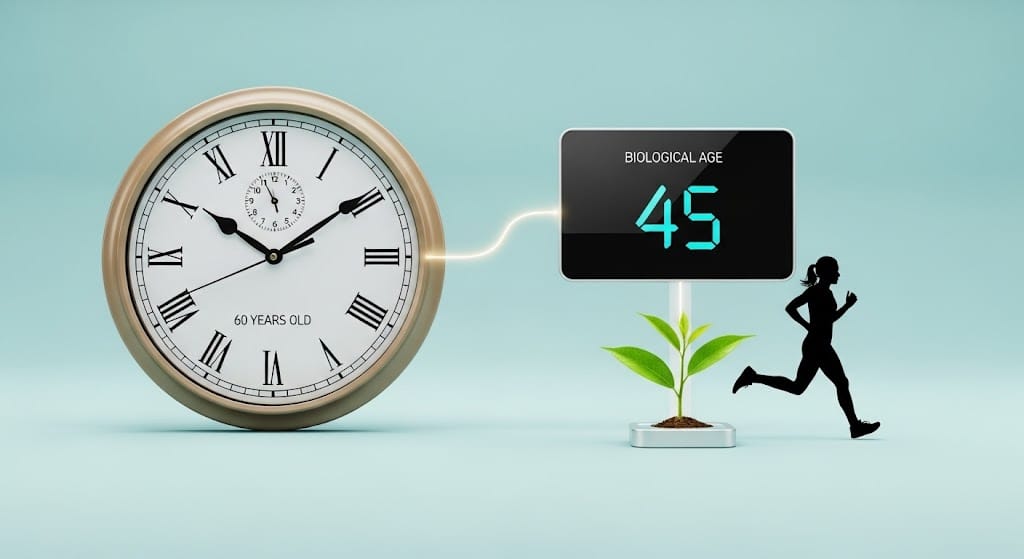How to Repair Damaged Cells Naturally
Learn how to repair damaged cells naturally with antioxidant foods, quality sleep, exercise, and science-backed supplements.
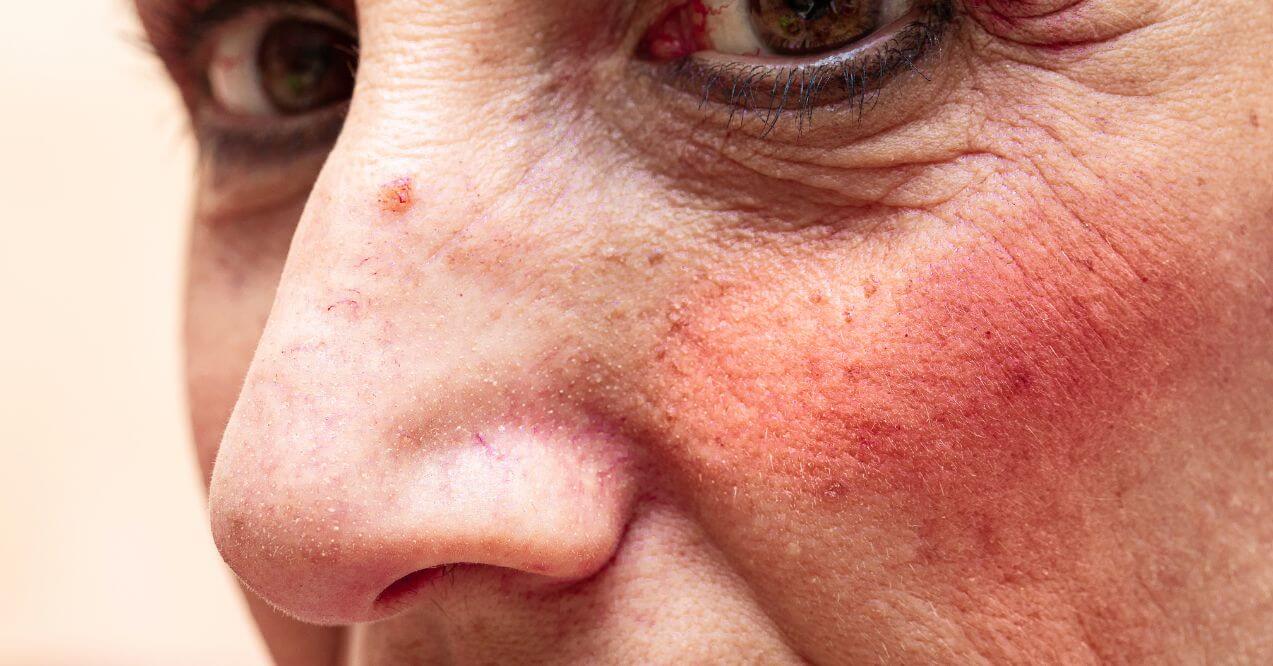

Think about the last time you got a small cut on your finger or spent too much time in the sun. Within days, your skin began to repair itself, forming new tissue and restoring its protective barrier. This remarkable process happens millions of times throughout your body every single day.
Your cells are constantly working to repair damage from daily wear and tear, environmental stressors, and the natural aging process. However, as we get older or develop poor lifestyle habits, this natural repair system can slow down significantly. The good news is that you can actively support your body’s cellular repair mechanisms through simple, natural approaches.
This guide will show you how to repair damaged cells naturally by understanding what harms your cells, how your body’s repair system works, and the specific foods, habits, and natural compounds that can support optimal cellular function and regeneration.
What Damages Our Cells?
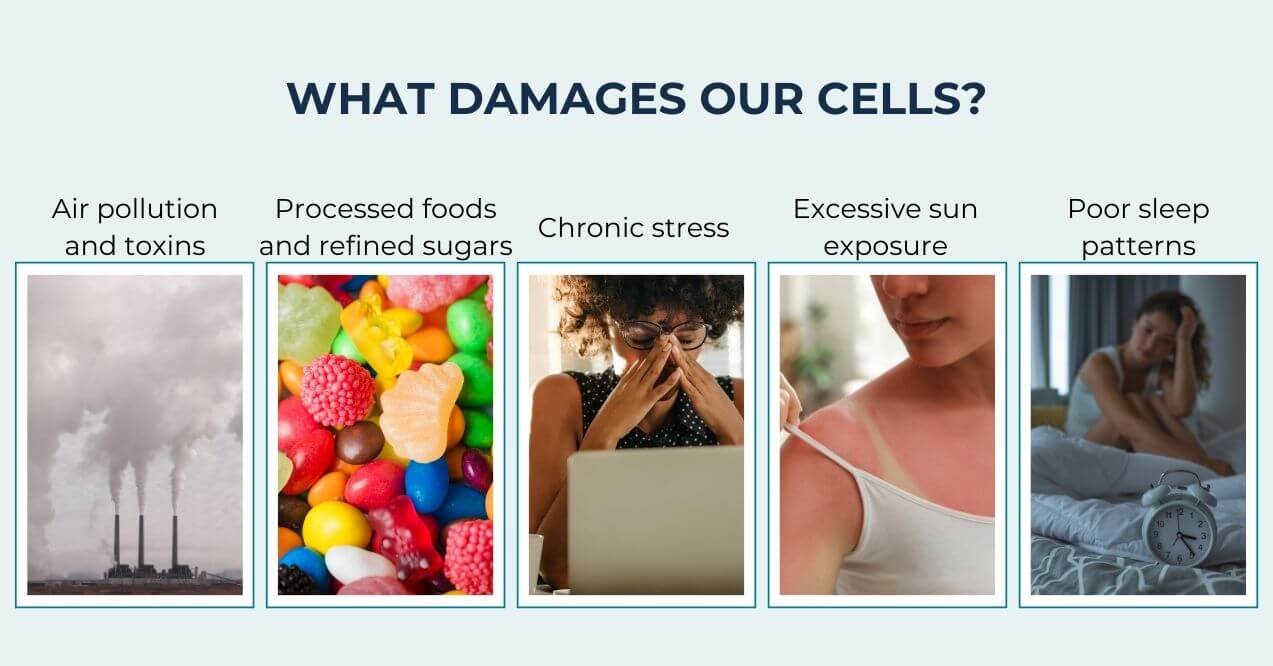
Every day, your cells face a constant battle against various harmful factors that can disrupt their normal function and structure. Understanding these cellular stressors helps you make better choices to support your body’s natural repair processes.
Environmental and lifestyle factors that stress your cells:
- Air pollution and toxins – Smog, cigarette smoke, and household chemicals create harmful molecules called free radicals that can damage cell membranes and internal structures
- Processed foods and refined sugars – These foods lack essential nutrients while promoting inflammation throughout your body, making it harder for cells to maintain themselves properly
- Chronic stress – When you’re constantly stressed, your body produces hormones that can interfere with cellular repair and regeneration processes
- Excessive sun exposure – UV radiation can damage the genetic material inside your cells, particularly in your skin
- Poor sleep patterns – Your cells do most of their repair work while you sleep, so inadequate rest disrupts this crucial maintenance time
- Sedentary lifestyle – Lack of movement reduces circulation, limiting the delivery of nutrients and oxygen that cells need to stay healthy
Natural aging also plays a significant role in cellular damage. As you get older, your cells naturally become less efficient at repairing themselves and removing waste products. This gradual decline is normal, but lifestyle choices can either accelerate or slow down this process considerably.
How Your Body Fixes Itself
Your body operates like a highly organized city with specialized teams working around the clock to maintain and repair cellular damage. These natural systems are constantly active, even when you’re sleeping, working to keep your cells functioning optimally.
Your body’s built-in repair systems:
- Cell cleanup crews (autophagy) – Think of these as your body’s recycling department. They identify damaged or worn-out cell parts and break them down, clearing away cellular waste and making room for fresh, healthy components
- DNA repair workers – Your cells have specialized mechanisms that scan for and correct damage to your genetic material. These molecular repair teams can identify problems and patch them up before they cause larger issues
- Cellular regeneration teams – These systems stimulate the creation of new, healthy cells to replace old or damaged ones. Different organs have varying regeneration speeds – your skin replaces itself every few weeks, while other tissues take longer
- Stem cell repair workers – These are your body’s master builders that can transform into different cell types as needed. They migrate to areas requiring repair and help rebuild damaged tissues
- Antioxidant defense squads – Your body produces natural compounds that neutralize harmful free radicals before they can cause cellular damage
Best Foods to Help Your Cells Heal
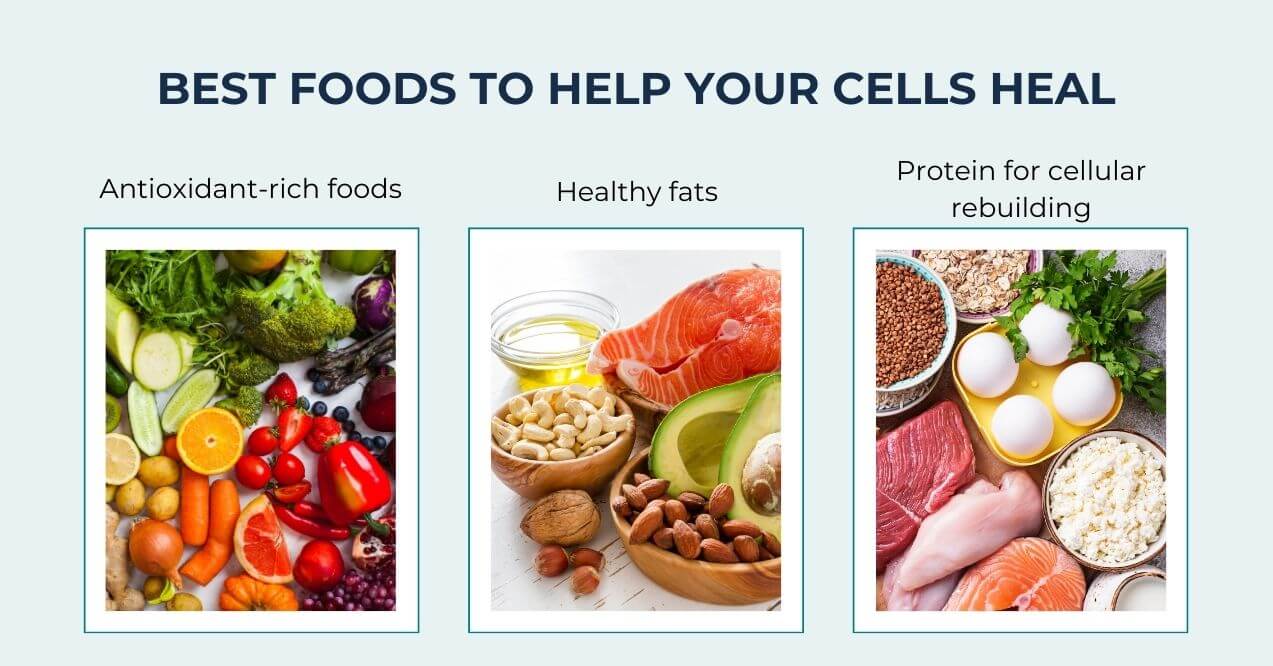
The foods you eat provide the essential building blocks your cells need for repair and regeneration. Anti-aging nutrition focuses on nutrient-dense foods that support your body’s natural cellular maintenance systems.
Antioxidant-rich foods (Cellular protection):
- Colorful berries – Blueberries, strawberries, and blackberries contain powerful compounds that neutralize harmful free radicals and support cellular protection
- Dark leafy greens – Spinach, kale, and Swiss chard provide vitamins and minerals that promote cellular repair processes
- Vibrant vegetables – Bell peppers, carrots, and sweet potatoes offer beta-carotene and other antioxidants that support healthy cell function
- Green tea – Contains polyphenols that may help activate your body’s natural cleanup systems
Healthy fats (Cell membrane support):
- Fatty fish – Salmon, sardines, and mackerel provide omega-3 fatty acids that maintain flexible, healthy cell membranes
- Nuts and seeds – Walnuts, almonds, chia seeds, and flaxseeds offer essential fats that support cellular structure
- Avocados – Rich in monounsaturated fats that help maintain cell membrane integrity
Protein for cellular rebuilding:
- Complete proteins – Eggs, chicken, and fish provide all essential amino acids needed for cellular repair and regeneration
- Plant proteins – Lentils, beans, and quinoa offer protein along with fiber and additional nutrients that support overall cellular health
- Greek yogurt – Contains protein plus beneficial probiotics that may support cellular function
Healthy Habits That Boost Cell Repair
Simple daily habits can significantly enhance your body’s natural ability to repair and regenerate cells. These lifestyle changes don’t require major overhauls – just consistent, mindful choices that support your cellular health.
Quality sleep:
- Your cells perform most of their maintenance work while you sleep, removing waste products and rebuilding damaged structures. Aim for 7-9 hours nightly.
- Going to bed and waking up at the same time helps optimize your body’s natural repair cycles
- Dark and cool bedroom promotes deeper, more restorative sleep that supports cellular regeneration
Regular movement:
- Physical activity stimulates circulation, delivering nutrients to cells while removing waste products more efficiently
- Consistent movement – whether it’s dancing, swimming, or gardening – helps activate your body’s natural cleanup systems and supports stem cell function.
Stress management:
- Just 5-10 minutes of deep breathing can lower stress hormones that interfere with cellular repair
- Relaxation techniques, whether it’s meditation, reading, or listening to music, support optimal cellular function.
Limit harmful substances:
- Smoking significantly impairs your body’s ability to repair cellular damage
- Excessive drinking can overwhelm your cells’ natural detoxification processes
How to Repair Damaged Cells Naturally with Supplements
Along with healthy habits and proper nutrition, the best longevity supplements may help support your body’s natural processes of renewal and balance. These nutrients work at the cellular level to promote energy, resilience, and overall vitality as you age.
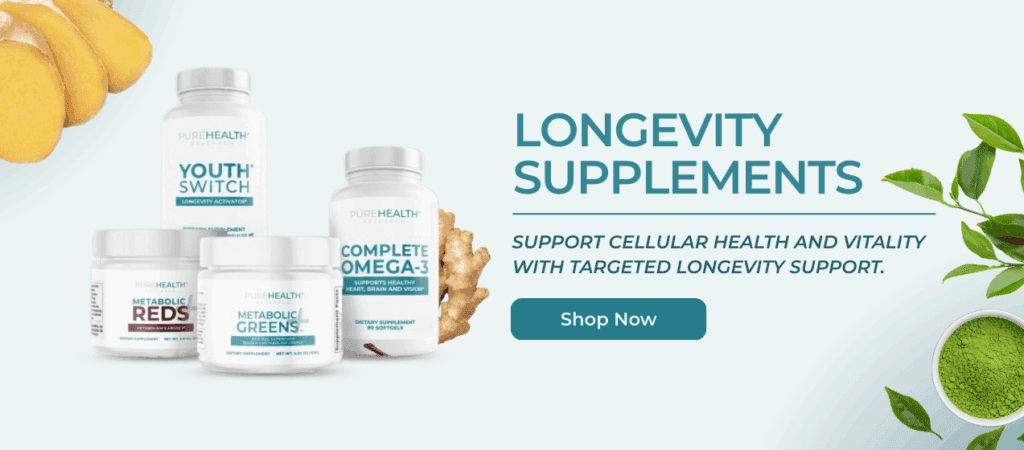
These supplements contain compounds like Ashwagandha, Cat’s Claw Bark Extract, Astragalus Root, and L-Glutamine that promote stress resilience, encourage cellular balance, and assist the body’s natural ability to revitalize itself. By supplying the body with these supportive compounds, Youth Switch helps maintain cellular function and allows you to feel more energized as you age.
Other options include NAD+ boosters, which help stimulate your cells’ energy production systems. As NAD+ levels decline with age, replenishing them may assist in maintaining mitochondrial function – the energy centers of your cells. Polyphenols, found in foods like berries and green tea, offer antioxidant support, which helps reduce oxidative stress and promotes cellular stability.
Some individuals also explore Pentadecanoic acid supplements – a unique fatty acid shown to help modulate gene expression and support metabolic balance, contributing to overall cellular wellness.
Conclusion
Your body is remarkably designed to repair and regenerate itself, but it needs your support to work at its best. Learning how to repair damaged cells naturally doesn’t require dramatic lifestyle overhauls – it starts with simple, consistent choices.
Focus on nourishing your cells with antioxidant-rich foods, prioritizing quality sleep, staying active, and managing stress effectively. When combined with targeted support like Youth Switch, these foundational habits create an environment where your natural repair systems can thrive.
Start small – choose one or two changes that feel manageable and build from there. Your cells will thank you for every positive step you take toward supporting their natural ability to maintain and restore your health.
Yes, your body has remarkable built-in repair systems that work constantly to maintain cellular health. However, these natural processes need proper support through nutritious foods, quality sleep, regular movement, stress management, and avoiding harmful substances to function optimally.
Antioxidant-rich berries like blueberries, dark leafy greens such as spinach, omega-3 fatty fish like salmon, and nuts including walnuts provide essential nutrients. These foods supply antioxidants, healthy fats, and proteins that support your body’s natural cellular repair mechanisms effectively.
Youth Switch contains eight scientifically proven natural ingredients including Ashwagandha, Cat’s Claw Bark Extract, Astragalus Root, and L-Glutamine. These compounds work synergistically to support your body’s existing anti-aging mechanisms, cellular regeneration processes, and overall natural repair systems safely and effectively.
Supplements aren’t always necessary, but high-quality options can provide additional support when combined with healthy lifestyle habits. The right supplements offer concentrated nutrients that may be difficult to obtain through diet alone, enhancing your body’s natural cellular repair capabilities.
Sign up for our Healthy Living newsletter!
Advertisement. This site offers health, wellness, fitness and nutritional information and is designed for educational purposes only. You should not rely on this information as a substitute for, nor does it replace, professional medical advice, diagnosis, or treatment. If you have any concerns or questions about your health, you should always consult with a physician or other health-care professional. Do not disregard, avoid or delay obtaining medical or health related advice from your health-care professional because of something you may have read on this site. The use of any information provided on this site is solely at your own risk.



